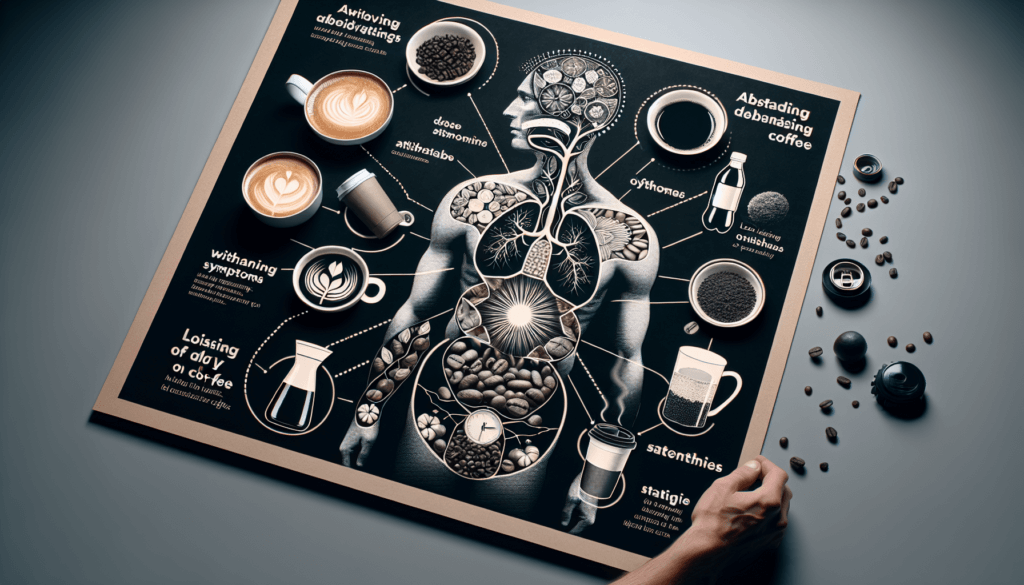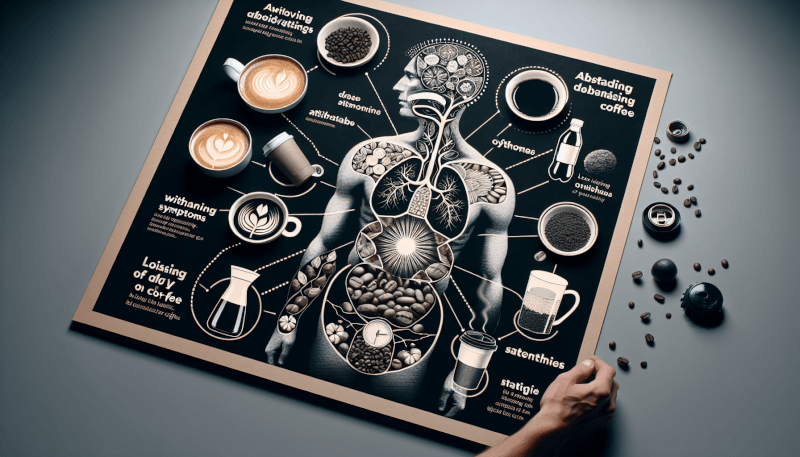Have you ever wondered what would happen if you decided to give up drinking coffee? You might be surprised to discover the impact it could have on your body and your daily routine. From a potential loss of energy and focus to changes in your mood and metabolism, the absence of coffee in your life can bring about some interesting effects. In this article, we’ll explore the various outcomes that may occur when you choose to forgo your morning cup of joe and how it could potentially alter your overall wellbeing. So, whether you’re a coffee aficionado contemplating a caffeine-free lifestyle or simply curious about the potential consequences, read on to uncover what happens if you don’t drink coffee!

Physical Effects of Not Drinking Coffee
Headaches
One of the most common physical effects of not drinking coffee is experiencing headaches. This is because caffeine, which is present in coffee, stimulates the central nervous system and can cause blood vessels in the brain to constrict. When you abruptly stop consuming caffeine, the sudden change in blood flow can lead to headaches. These headaches can range from mild to severe and can last for a few days until your body adjusts to the lack of caffeine.
Fatigue
Another physical effect of not drinking coffee is increased fatigue. Coffee contains caffeine, a stimulant that helps to temporarily boost energy levels. When you remove caffeine from your daily routine, you may experience a decrease in energy and feel more tired throughout the day. This can be especially noticeable in the mornings when many people rely on coffee to jump-start their day.
Irritability
Without coffee, you may find yourself feeling more irritable than usual. Caffeine acts as a mild mood enhancer by stimulating the release of certain neurotransmitters in the brain, such as dopamine and serotonin. These neurotransmitters are associated with feelings of pleasure and happiness. When you stop consuming coffee, you may experience a dip in these neurotransmitters, leading to feelings of irritability or even mood swings.
Muscle Tremors
Excessive consumption of caffeine can lead to muscle tremors or twitches due to its stimulant effect on the nervous system. If you suddenly stop drinking coffee, your body may go through a temporary adjustment period, causing muscle tremors as it adapts to the absence of caffeine. These tremors are usually harmless and tend to diminish over time as your body adjusts to the change.
Difficulty Concentrating
Coffee is often relied on as a cognitive enhancer, helping to improve focus and concentration. When you stop consuming coffee, you may experience difficulty concentrating, especially during tasks that require sustained mental effort. This can be particularly challenging during the initial period of caffeine withdrawal. However, it’s important to note that these effects are temporary, and your ability to concentrate should improve as your body adjusts.
Changes in Mood and Mental Well-being
Decreased Alertness
One of the primary effects of coffee is increased alertness. Caffeine stimulates the central nervous system, making you feel more awake and alert. When you quit drinking coffee, you may notice a decrease in your overall level of alertness. This can affect your ability to stay focused, make quick decisions, or react to stimuli promptly. It’s important to be aware of this change and find alternative ways to stay alert and engaged throughout the day.
Depression
Some individuals may experience feelings of depression when they stop consuming coffee. This can be attributed to the withdrawal symptoms associated with caffeine, as well as the potential impact on neurotransmitters in the brain. If you notice a significant change in your mood after quitting coffee, it’s important to seek support from a healthcare professional.
Anxiety
Coffee can contribute to feelings of anxiety in certain individuals, especially when consumed in large amounts. If you’ve been relying on coffee to manage stress or stay alert, quitting coffee can initially exacerbate feelings of anxiety. This is because caffeine withdrawal can cause an increase in heart rate and nervousness. It’s essential to develop healthy coping mechanisms and seek support if anxiety becomes problematic.
Mood Swings
Coffee consumption, particularly in excess, can trigger mood swings in some individuals. The sudden removal of caffeine from your daily routine may result in a period of adjustment during which you may experience more frequent and intense mood swings. This can be attributed to the impact of caffeine on neurotransmitters in the brain. However, these mood swings are typically temporary and should subside as your body adjusts to the withdrawal.
Reduced Motivation
Coffee is often associated with a boost in motivation and productivity. When you stop drinking coffee, you may notice a decline in your motivation levels, making it harder to initiate and complete tasks. This can be attributed to the absence of caffeine’s stimulant effects on the brain. Finding alternative ways to stay motivated, such as setting goals, practicing self-care, and maintaining a positive mindset, can help counteract this effect.
Sleep Patterns and Quality
Disrupted Sleep
Caffeine can have a significant impact on sleep patterns, particularly if consumed later in the day. It acts as a stimulant, increasing alertness and inhibiting the onset of sleep. When you stop drinking coffee, you may experience a disruption in your sleep patterns. This can manifest as difficulty falling asleep or frequent awakenings throughout the night.
Difficulty Falling Asleep
Coffee can interfere with the body’s natural sleep-wake cycle by blocking adenosine receptors in the brain, a neurotransmitter that promotes sleepiness. As a result, quitting coffee may lead to difficulty falling asleep, as the absence of caffeine can make it challenging to induce sleepiness. Establishing a relaxing bedtime routine and avoiding caffeine-containing beverages or foods close to bedtime can help mitigate this effect.
Increased Daytime Sleepiness
While coffee can help combat daytime sleepiness by increasing alertness, quitting coffee may lead to an increase in daytime sleepiness. This is because the absence of caffeine can contribute to feelings of fatigue and drowsiness throughout the day. Ensuring sufficient and quality sleep, practicing good sleep hygiene, and maintaining a consistent sleep schedule can help reduce daytime sleepiness.
Restless Sleep
Coffee consumption can disrupt the depth and quality of your sleep, leading to more restless nights. The stimulating effect of caffeine can cause an increase in brain activity, making it more difficult to achieve deep sleep stages. When you stop drinking coffee, you may experience improvements in the overall quality of your sleep, including reduced restlessness and better sleep continuity.
Digestive System
Change in Bowel Movements
Coffee is well known for its laxative effects, and quitting coffee may lead to changes in bowel movements. Coffee stimulates the muscles in the digestive tract, promoting movement and resulting in more regular bowel movements for some individuals. When you stop consuming coffee, you may notice a temporary disruption in your bowel habits as your body adjusts to the absence of this stimulant. Be aware of any changes and ensure you’re maintaining a healthy and balanced diet to support regular bowel movements.
Acid Reflux
Coffee is acidic in nature and can contribute to the development or worsening of acid reflux symptoms. The caffeine in coffee can relax the lower esophageal sphincter (LES), a muscle that helps prevent stomach acid from flowing back into the esophagus. When you quit drinking coffee, you may notice a reduction in acid reflux symptoms, such as heartburn or indigestion.
Upset Stomach
Coffee consumption can irritate the lining of your stomach, leading to digestive discomfort or an upset stomach. Eliminating coffee from your routine may help alleviate these symptoms, allowing your stomach to heal if it had been previously irritated by coffee intake. If you experience persistent stomach issues, it’s important to consult with a healthcare professional to determine the underlying cause and appropriate treatment.
Constipation
While coffee can have a laxative effect on some individuals, it can also contribute to digestive issues such as constipation. Coffee has been found to increase colonic activity and promote regular bowel movements in some individuals. However, if you’ve been relying on coffee as a way to regulate your bowel movements, quitting coffee may initially result in constipation. Ensuring adequate fiber intake, staying hydrated, and maintaining a balanced diet can help overcome this issue.

Cardiovascular Effects
Increased Blood Pressure
Coffee consumption, especially in larger amounts, can lead to a temporary increase in blood pressure. This is because caffeine can cause blood vessels to constrict, resulting in elevated blood pressure levels. When you cease drinking coffee, you may observe a decrease in your blood pressure readings. However, it’s important to note that if you have an existing or underlying cardiovascular condition, it’s advisable to consult with a healthcare professional before quitting coffee.
Rapid Heart Rate
Caffeine stimulates the central nervous system, increasing heart rate and blood flow. If you’ve been consuming coffee regularly, quitting coffee can cause a temporary increase in heart rate as your body adjusts to the absence of caffeine. This increase is typically mild and should return to normal as your body adapts to the change.
Risk of Heart Disease
Regular and excessive coffee consumption has been associated with an increased risk of certain cardiovascular conditions, such as heart disease. However, research on this topic is ongoing, and the relationship between coffee consumption and heart health is multifactorial. Quitting coffee may help decrease potential risk factors associated with excessive consumption, but it’s important to maintain an overall healthy lifestyle to promote cardiovascular health.
Appetite and Weight Changes
Decreased Appetite
Coffee, particularly when consumed on an empty stomach, can act as an appetite suppressant. If you’ve been relying on coffee to suppress your appetite, quitting coffee may result in an increased desire for food and a heightened sense of hunger. It’s important to listen to your body’s hunger cues and ensure you’re consuming a balanced and nutritious diet. Regular mealtimes and mindful eating practices can help regulate your appetite.
Weight Gain
While coffee itself is calorie-free, the additions made to coffee, such as sugar, cream, or syrups, can contribute to weight gain. If you’ve been consuming coffee with high calorie or sugary additions, quitting coffee may contribute to a decrease in overall calorie intake, potentially leading to weight loss or weight management. However, it’s important to note that the impact on weight can vary from person to person, and overall dietary and physical activity habits play a significant role.
Cravings for Sugary Foods
Coffee consumption, especially when paired with sweeteners, can alter taste perceptions and potentially increase cravings for sugary foods. Quitting coffee may result in a reduced desire for these sweet treats, leading to an overall decrease in sugar consumption. However, it’s important to be mindful of other dietary choices and make conscious decisions to maintain a balanced and nutritious diet.

Withdrawal Symptoms
Headaches
Quitting coffee can lead to withdrawal symptoms, and headaches are one of the most common. As mentioned earlier, caffeine withdrawal can cause blood vessels in the brain to constrict or expand, leading to headaches. These headaches are usually temporary and should subside within a few days as your body adjusts to the absence of caffeine. Staying hydrated, practicing relaxation techniques, and getting enough rest can help alleviate these symptoms.
Fatigue and Sleepiness
Quitting coffee can initially result in increased fatigue and sleepiness. The absence of caffeine can make it challenging to maintain adequate energy levels throughout the day, leading to feelings of tiredness. Ensuring you’re getting enough sleep at night, staying active, and incorporating energy-boosting foods into your diet can help combat fatigue and sleepiness during the withdrawal period.
Difficulty Concentrating
Coffee is often relied upon as a cognitive enhancer, aiding in concentration and focus. When you stop drinking coffee, you may experience difficulty concentrating, especially during the initial phase of caffeine withdrawal. Practicing mindfulness techniques, breaking tasks into smaller, manageable chunks, and maintaining a calm and organized environment can help mitigate difficulties with concentration.
Depression
As mentioned earlier, quitting coffee can potentially affect mood and contribute to feelings of depression. The withdrawal period may be accompanied by a temporary decrease in neurotransmitters associated with mood regulation, leading to feelings of sadness or depression. If you notice a significant change in your mood, it’s crucial to seek support from a healthcare professional.
Anxiety
Caffeine withdrawal can cause an increase in heart rate and nervousness, potentially exacerbating feelings of anxiety. If you’ve been relying on coffee as a way to manage stress or stay alert, quitting coffee can initially intensify anxiety symptoms. It’s important to develop healthy coping mechanisms and seek support if anxiety becomes overwhelming or interferes with daily functioning.
Coffee Alternatives
Herbal Teas
When quitting coffee, herbal teas can be a great alternative. Herbal teas are naturally caffeine-free and come in a wide variety of flavors, offering a soothing and comforting beverage option. Some popular herbal teas include chamomile, peppermint, ginger, and rooibos. Experimenting with different herbal teas can help you find a replacement for the ritual and taste associated with coffee.
Decaffeinated Coffee
If you still enjoy the taste and aroma of coffee but want to reduce your caffeine intake, decaffeinated coffee can be an option. Decaffeinated coffee has undergone a process to reduce its caffeine content while retaining the familiar coffee flavor. It’s important to note that decaffeinated coffee is not completely caffeine-free, as it still contains a small amount of caffeine. However, the caffeine content is significantly lower compared to regular coffee.
Energy-Boosting Foods
Instead of relying solely on caffeine for an energy boost, incorporating energy-boosting foods into your diet can provide sustained energy throughout the day. Foods rich in complex carbohydrates, such as whole grains, fruits, and vegetables, can provide a slow and steady release of energy. Additionally, incorporating protein-rich foods, healthy fats, and staying hydrated can help maintain stable energy levels.
Hydration
Staying hydrated plays a vital role in overall well-being, including energy levels and cognitive function. Drinking enough water throughout the day can help combat fatigue and keep your body functioning optimally. You can enhance hydration by infusing water with fruits or herbs for added flavor. Avoiding excessive caffeine intake is also beneficial for hydration, as coffee can have diuretic effects and increase fluid loss.

Long-term Effects of Quitting Coffee
Reduced Dependence on Stimulants
Quitting coffee can lead to a reduced dependence on stimulants. Coffee contains caffeine, a stimulant that can create a cycle of dependence, leading to the need for higher doses to achieve the same effects. By quitting coffee, you give your body a chance to reset and reduce its reliance on external stimulants to stay energized.
Improved Sleep Quality
Caffeine can interfere with the quality of your sleep by delaying the onset of sleep and promoting restlessness during the night. By eliminating coffee from your routine, you may experience improved sleep quality, allowing you to wake up feeling more refreshed and rejuvenated. Establishing a consistent sleep schedule, practicing good sleep hygiene, and creating a relaxing bedtime routine can further enhance sleep quality.
Stable Energy Levels
Coffee provides a temporary energy boost due to its stimulant effects. However, the energy boost is often followed by a crash, leaving you feeling fatigued and in need of another pick-me-up. By quitting coffee, you can experience more stable energy levels throughout the day, without the highs and lows associated with caffeine intake. Incorporating a well-balanced diet and regular exercise can help maintain consistent energy levels.
Healthier Digestive System
Quitting coffee can have positive effects on your digestive system. Coffee consumption, especially in excess, has been linked to digestive issues such as acid reflux and stomach irritation. Eliminating coffee can help reduce the risk of these issues and allow your digestive system to heal. Additionally, removing high-calorie or sugary additions to coffee can contribute to a healthier overall diet, supporting optimal digestive function.
Making the Transition: Tips for Quitting Coffee
Gradual Reduction
Quitting coffee cold turkey can lead to more pronounced and uncomfortable withdrawal symptoms. Gradually reducing your coffee intake over time can help minimize the intensity of withdrawal symptoms. Start by cutting down the number of cups you consume per day and slowly replace them with alternatives. This gradual reduction allows your body to adjust more smoothly to the absence of caffeine.
Replacing with Healthier Alternatives
Replacing coffee with healthier alternatives can make the transition easier. As mentioned earlier, herbal teas and decaffeinated coffee are good options. Experiment with different flavors and find alternatives that provide a similar sensory experience to coffee. Additionally, incorporating energy-boosting foods and staying hydrated can help reduce the need for caffeine to stay alert and energized.
Managing Withdrawal Symptoms
Being aware of and managing withdrawal symptoms can help you navigate the quitting process more effectively. Stay hydrated, get enough rest, and practice relaxation techniques to alleviate headaches and fatigue. Engage in stress-management activities, such as meditation or deep breathing exercises, to reduce anxiety or irritability. If withdrawal symptoms become severe or significantly impact your daily life, it’s important to seek support from a healthcare professional.
Creating a Consistent Sleep Schedule
Establishing a consistent sleep schedule can help regulate your body’s natural sleep-wake cycle, making it easier to fall asleep and wake up refreshed. Aim to go to bed and wake up at the same time every day, even on weekends. Avoiding caffeine and stimulating activities close to bedtime can also support a consistent sleep schedule. Remember that quality sleep is crucial for overall well-being and energy levels.
Staying Hydrated
Staying hydrated is essential during the transition away from coffee. Drinking enough water can help alleviate some withdrawal symptoms, such as headaches and fatigue. Aim to drink at least eight glasses of water per day and incorporate hydrating foods, such as fruits and vegetables, into your diet. Herbal teas and infused water can also contribute to your daily hydration goals.
In conclusion, quitting coffee can lead to a range of physical and mental effects as your body adjusts to the absence of caffeine. From headaches and fatigue to changes in mood and sleep patterns, it’s important to be aware of these potential effects and find alternative ways to support your well-being. By gradually reducing your coffee intake, incorporating healthier alternatives, and managing withdrawal symptoms, you can make a successful transition away from coffee. Ultimately, the long-term effects of quitting coffee include reduced dependence on stimulants, improved sleep quality, stable energy levels, and a healthier digestive system. Remember to prioritize self-care and seek support if needed during this journey.



